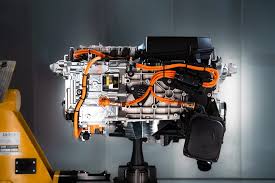
Breaking News
Catch Your Dream: Love it, Do it, Live it
 BMW to begin series production of 3rd-gen hydrogen fuel cell system
BMW to begin series production of 3rd-gen hydrogen fuel cell system
 The world you know will be nearly UNRECOGNIZABLE by 2030: AI, robots, revolts...
The world you know will be nearly UNRECOGNIZABLE by 2030: AI, robots, revolts...
 I didn't think this was real..It is! Warning
I didn't think this was real..It is! Warning
Top Tech News
 Neuroscientists just found a hidden protein switch in your brain that reverses aging and memory loss
Neuroscientists just found a hidden protein switch in your brain that reverses aging and memory loss
 NVIDIA just announced the T5000 robot brain microprocessor that can power TERMINATORS
NVIDIA just announced the T5000 robot brain microprocessor that can power TERMINATORS
 Two-story family home was 3D-printed in just 18 hours
Two-story family home was 3D-printed in just 18 hours
 This Hypersonic Space Plane Will Fly From London to N.Y.C. in an Hour
This Hypersonic Space Plane Will Fly From London to N.Y.C. in an Hour
 Magnetic Fields Reshape the Movement of Sound Waves in a Stunning Discovery
Magnetic Fields Reshape the Movement of Sound Waves in a Stunning Discovery
 There are studies that have shown that there is a peptide that can completely regenerate nerves
There are studies that have shown that there is a peptide that can completely regenerate nerves
 Swedish startup unveils Starlink alternative - that Musk can't switch off
Swedish startup unveils Starlink alternative - that Musk can't switch off
 Video Games At 30,000 Feet? Starlink's Airline Rollout Is Making It Reality
Video Games At 30,000 Feet? Starlink's Airline Rollout Is Making It Reality
 Grok 4 Vending Machine Win, Stealth Grok 4 coding Leading to Possible AGI with Grok 5
Grok 4 Vending Machine Win, Stealth Grok 4 coding Leading to Possible AGI with Grok 5
BMW to begin series production of 3rd-gen hydrogen fuel cell system

Components for the third-generation HFC will be manufactured at BMW Group facilities in Steyr, Landshut, and Munich. The fuel cells themselves are supplied by Toyota, extending a long-standing collaboration between the two companies. While Toyota designed the first-generation system entirely, the second generation was a joint effort. The new third-generation system is developed entirely by BMW, apart from the fuel cells themselves.
The two companies will be working together on commercial and passenger vehicle fuel cell propulsion units. This allows brand-specific vehicles to be designed for the HFC system while reducing costs in development and procurement for the system.
This third-generation hydrogen fuel cell system is 25% smaller than its predecessor and has been designed to fit in the space normally occupied by a combustion engine. This allows easy integration into existing or new-generation architectures without many changes to accommodate the HFC and surrounding systems. The third-gen system also features an improved operating strategy and newly developed drive technology to increase efficiency.
Testing of noise, vibration, and harshness (NVH) levels and output are being undertaken to compare against other propulsion options. Other output comparisons will be done before production as well.
The prototypes being produced in Munich use a compact layout that includes the hydrogen and air delivery systems, cooling system, electrical delivery components, and water extraction from the hydrogen-oxygen result as one complete set. The prototypes are being used as final proof of concept and safety and will inform tooling and production requirements at Steyr ahead of series production.
Meanwhile, BMW's Landshut facility, which currently builds the iX5 Hydrogen pilot fleet, will continue manufacturing housings and pressure plates for the next generation of hydrogen fuel cell vehicles.

 HERE COMES THE MOTHERSHIP
HERE COMES THE MOTHERSHIP

